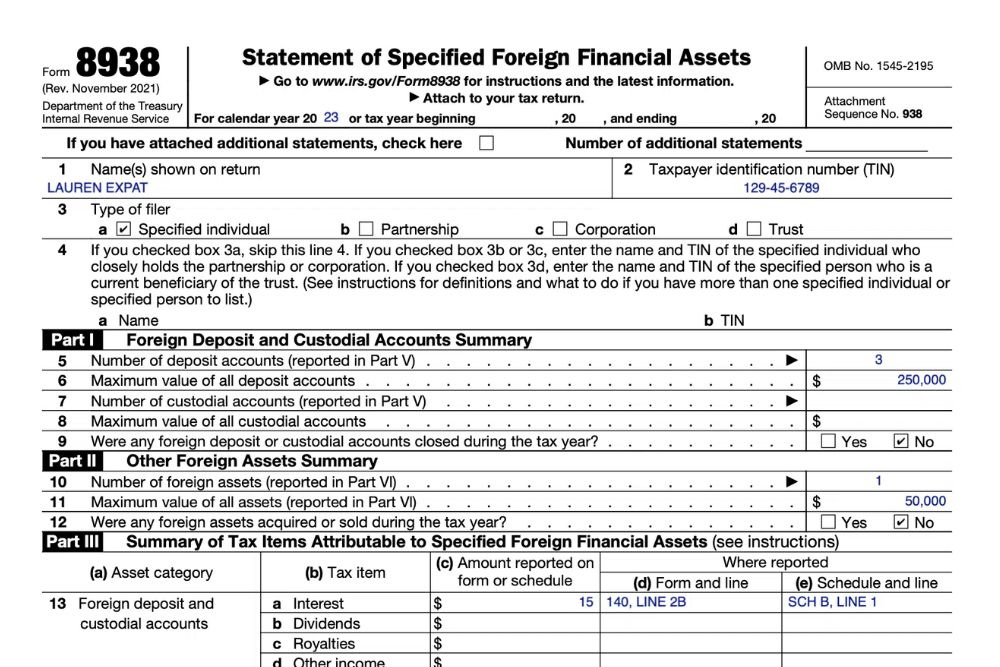What is FATCA? Foreign Account Tax Compliance Act Explained

- Why Does FATCA Exist?
- Who Must Follow FATCA Rules?
- When Do I Need to File a FATCA Report?
- What Assets Does FATCA Cover?
- How Do I Report Under FATCA?
- Is FATCA the Same as FBAR?
- Can I Skip Reporting Assets I Already Disclosed?
- What Are the Penalties for Not Filing?
- What If I Didn't File FATCA in Previous Years?
- Will I Owe US Tax on My Foreign Accounts?
- Get Help with FATCA Compliance
- Frequently Asked Questions About FATCA
FATCA stands for the Foreign Account Tax Compliance Act, a US tax law requiring Americans to report foreign financial assets above certain dollar thresholds. According to the IRS, over 110 countries have FATCA agreements with the United States, making this one of the most far-reaching tax compliance initiatives in history. If you’re a US citizen with bank accounts, investments, or pensions abroad, here’s what you need to know to stay compliant without stress.
Key Takeaways
- FATCA is US legislation designed to prevent offshore tax evasion
- US persons must disclose foreign financial assets using Form 8938
- Reporting obligations depend on total asset values and your residency status
- Non-compliance can trigger penalties starting at $10,000 per year
- Catch-up programs exist for taxpayers who missed previous filings
- Most Americans abroad owe little to no US tax, even when filing is required
Why Does FATCA Exist?
Congress passed FATCA in 2010 to combat tax evasion by Americans hiding money in offshore accounts. Before FATCA, the IRS had limited visibility into foreign financial assets, making it easier for some taxpayers to conceal income from US taxation.
FATCA creates transparency in two ways. First, it requires foreign banks and financial institutions to report information about US account holders directly to the IRS. Second, it requires individual Americans to disclose their foreign assets when the value exceeds specific dollar amounts.
While FATCA targets intentional tax evaders, it affects millions of honest Americans living abroad who maintain legitimate foreign accounts for everyday expenses, retirement savings, and regular financial planning.
Who Must Follow FATCA Rules?
FATCA applies to all US persons, a tax term that includes:
- US citizens living anywhere in the world
- Green card holders (lawful permanent residents)
- Tax residents who meet the substantial presence test
- Certain trusts and estates with US beneficiaries
If you fall into any of these categories and hold foreign financial assets, you need to know whether you have FATCA reporting obligations.
When Do I Need to File a FATCA Report?
You must file when your specified foreign financial assets exceed certain thresholds. These amounts vary based on where you live and how you file your taxes.
FATCA Reporting Thresholds
| Your Situation | Reporting Required When Assets Exceed |
|---|---|
| Single, living in the US | $50,000 on Dec 31 OR $75,000 anytime during the year |
| Married filing jointly, living in the US | $100,000 on Dec 31 OR $150,000 anytime during the year |
| Single, living abroad | $200,000 on Dec 31 OR $300,000 anytime during the year |
| Married filing jointly, living abroad | $400,000 on Dec 31 OR $600,000 anytime during the year |
Notice that thresholds are significantly higher for Americans living outside the United States. Congress recognized that expats often need larger foreign account balances to cover living expenses in their country of residence.
You must meet BOTH the year-end AND the any-time-during-year test. If you exceed either threshold, you have a reporting obligation.
What Assets Does FATCA Cover?
FATCA requires reporting of “specified foreign financial assets,” which include a wide range of holdings:
Foreign Financial Accounts
- Bank accounts (checking, savings, money market)
- Brokerage and securities accounts
- Mutual fund accounts held abroad
- Commodity and derivatives accounts
Foreign Investments and Interests
- Stock or securities issued by non-US entities
- Partnership interests in foreign partnerships
- Beneficial interests in foreign trusts
- Foreign pension plans and deferred compensation
- Life insurance policies with cash value issued by foreign insurers
- Foreign hedge fund interests
What About Foreign Real Estate?
Direct ownership of foreign real estate (titled in your own name) is NOT a specified foreign financial asset under FATCA. Your vacation home in Portugal or rental property in Mexico doesn’t count toward the threshold.
However, if you own property through a foreign corporation or partnership, that entity ownership must be reported. The distinction matters: it’s not the real estate itself, but rather your ownership stake in the foreign entity holding the property.
When determining whether an asset qualifies, remember that there are no penalties for over-reporting, only for omitting required assets. If you’re unsure, it’s safer to include it.
Some taxpayers qualify for specific exemptions based on their circumstances. Learn more about FATCA exemptions to see if you can avoid unnecessary reporting.
How Do I Report Under FATCA?
FATCA reporting is accomplished through Form 8938, Statement of Specified Foreign Financial Assets. You file this form alongside your regular tax return (Form 1040).
What Form 8938 Requires
For each reportable asset, you provide:
- Asset description and identifying information
- Maximum value during the tax year
- Whether the asset generated taxable income
- Name and address of the financial institution (for accounts)
The form itself is relatively straightforward once you’ve gathered the necessary information. The challenge typically lies in determining which assets to include and accurately calculating their maximum values.
Get the Free Download That Makes Filing Taxes Simple
"*" indicates required fields

Is FATCA the Same as FBAR?
No. Many people confuse FATCA reporting with FBAR (Foreign Bank Account Report) filing, but they’re different requirements with different rules:
FBAR (FinCEN Form 114):
- Lower $10,000 threshold
- Covers only foreign financial accounts
- Filed separately with the Financial Crimes Enforcement Network
- Due April 15 with automatic extension to October 15
FATCA (Form 8938):
- Higher thresholds ($50,000 to $600,000)
- Covers accounts PLUS other foreign assets like stocks and partnerships
- Filed with your income tax return
- Due when your tax return is due (including extensions)
You may need to file both forms if you meet the respective thresholds. For a detailed comparison, read our FBAR vs Form 8938 guide.
Can I Skip Reporting Assets I Already Disclosed?
Yes, in some cases. You can exclude certain assets from Form 8938 if they’re already reported on other tax forms:
- Foreign corporations on Form 5471
- Foreign partnerships on Form 8865
- Foreign trusts on Form 3520
- PFICs on Form 8621
Important distinction: These assets still COUNT toward determining if you meet the reporting threshold. You just don’t list them again on Form 8938 itself once they’re reported elsewhere.
Additionally, certain individuals and asset types qualify for complete exemptions. Read our detailed guide on FATCA exemptions to learn about who qualifies.
What Are the Penalties for Not Filing?
The IRS imposes substantial penalties for FATCA violations:
- $10,000 for each year you fail to file Form 8938
- An additional $10,000 per month (up to $50,000 maximum) if you continue not filing after IRS notification
- 40% penalty on any tax understatement related to undisclosed foreign assets
These penalties apply on a per-tax-year basis, so multiple years of non-compliance can result in significant financial consequences. The good news? These penalties are completely avoidable by filing correctly and on time.
What If I Didn’t File FATCA in Previous Years?
If you’ve failed to file required FATCA reports in past years, don’t panic. The IRS offers amnesty programs that allow you to become compliant without facing the usual penalties.
The most popular option for expats is the Streamlined Filing Compliance Procedures. This program allows you to:
- File up to three years of past tax returns with Form 8938
- Submit six years of FBARs
- Avoid all penalties by certifying your non-compliance was non-willful (unintentional)
Eligibility requirement: Your failure to file must have been unintentional. Most expats who simply didn’t know about FATCA qualify for this program.
Critical deadline: You must start this process BEFORE the IRS contacts you about your non-compliance. Once they reach out first, you lose eligibility for penalty relief.
Why “Quiet Disclosures” Create More Problems
Some taxpayers attempt “quiet disclosures,” which means filing delinquent returns without formally entering a compliance program or notifying the IRS. This approach is risky. If the IRS identifies your quiet disclosure, you’ll be ineligible for streamlined procedures and face full penalties.
The safer path is always to use the proper compliance program when catching up on past filings.
Will I Owe US Tax on My Foreign Accounts?
Here’s the good news: filing FATCA doesn’t mean you’ll owe US tax. FATCA is an information reporting requirement, not a tax itself.
Most Americans living abroad can use the Foreign Earned Income Exclusion or Foreign Tax Credit to reduce or eliminate their US tax liability. Even if you’re required to report substantial foreign assets, you’ll likely owe little to nothing in actual US taxes.
Get Help with FATCA Compliance
FATCA compliance can be complex, especially when calculating asset values or determining what needs reporting. Greenback Expat Tax Services helps Americans worldwide with FATCA form preparation and compliance.
We can help you:
- Determine if you need to file Form 8938
- Calculate the value of your foreign assets correctly
- Catch up on past filings through the Streamlined Procedures
- Ensure you’re meeting all your expat tax obligations
Ready to get started? Click below to be matched with a Greenback accountant. For questions about our services, contact our Customer Champions.
Frequently Asked Questions About FATCA
What is FATCA reporting?
FATCA reporting means disclosing your foreign financial assets to the IRS when they exceed certain dollar thresholds. This is done using Form 8938, which is filed with your annual tax return. The requirement applies when your total specified foreign financial assets exceed amounts ranging from $50,000 to $600,000, depending on your filing status and where you live.
What does FATCA stand for?
FATCA is the acronym for the Foreign Account Tax Compliance Act, a US legislation enacted in 2010 to prevent offshore tax evasion by increasing transparency around foreign financial assets held by Americans.
Who needs to file FATCA?
US citizens, green card holders, and tax residents must file Form 8938 when their foreign financial assets exceed the reporting thresholds. These thresholds range from $50,000 to $600,000, depending on filing status and whether you live inside or outside the United States.
What is the FATCA form?
The FATCA form is IRS Form 8938, Statement of Specified Foreign Financial Assets. It collects detailed information about your foreign financial accounts and assets, including account balances, maximum values during the year, and income generated from these assets.
What is the meaning of FATCA for Americans abroad?
For expats, FATCA means additional tax reporting responsibilities when holding foreign financial assets above certain thresholds. While designed to catch tax evaders, it affects all Americans with international accounts. The good news is that filing FATCA doesn’t mean you’ll owe US tax, and most expats can use exclusions and credits to reduce their tax bill to zero.
How is FATCA different from FBAR?
FATCA (Form 8938) has higher thresholds and covers both accounts and non-account assets like foreign stocks and partnerships. FBAR has a $10,000 threshold and only covers bank and financial accounts. Both may be required, and they’re filed separately to different agencies.
Can I fix past FATCA non-compliance?
Yes. The Streamlined Filing Procedures allow taxpayers to catch up on missed FATCA filings without penalties if the non-compliance was non-willful (unintentional) and they act before the IRS contacts them about the issue.
What are FATCA penalties?
FATCA penalties start at $10,000 per year for unfiled Form 8938 and can reach $50,000 for continued non-compliance after IRS notification. The IRS can also impose a 40% penalty on any tax understatement related to undisclosed foreign assets.
Do I need to report my foreign home?
No. Real estate owned directly in your name is not a specified foreign financial asset under FATCA. However, if you own property through a foreign corporation or partnership, you must report your ownership stake in that entity.
What is a specified foreign financial asset?
A specified foreign financial asset is any foreign account or investment that must be disclosed under FATCA. This includes bank accounts, stocks, bonds, partnership interests, foreign pensions, and certain insurance policies with cash value. The term specifically excludes directly-owned real estate and physical assets like precious metals.



